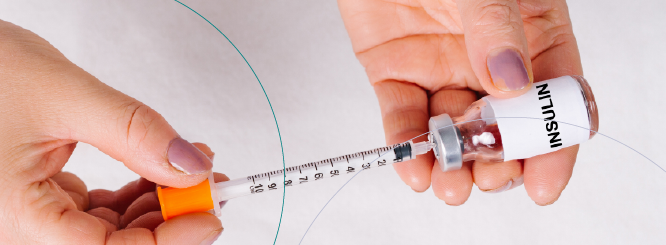
Insulin resistance is a common health concern that is increasingly affecting millions of people worldwide. With rising cases of diabetes, obesity and prediabetes, having an understanding of insulin resistance has become more critical than ever.
In this blog, we will talk about what insulin resistance is, its causes, symptoms, and the treatment options available for those individuals diagnosed with insulin resistance. If you or a loved one could be at risk, read on and learn how to manage this condition, and with the help of our expert medical professionals at LIMARP, you can find a way to treat it effectively.
What is Insulin Resistance?
Insulin resistance takes place when the body’s cells become less responsive to it, insulin is a hormone produced by the pancreas that aids in regulating blood sugar levels. Usually, it eases the uptake of glucose (sugar) into the cells, where it can be used as energy. However, when these cells become resistant the glucose can remain in the bloodstream, causing it to elevate blood sugar levels.
After some time, this can cause prediabetes and eventually, type 2 diabetes if not treated adequately. Insulin resistance doesn’t just appear overnight it usually develops slowly, making it quite difficult to detect without going through specific tests. This calls attention to the importance of routine health checkups, especially for individuals who are at high risk.
Causes of Insulin Resistance
There is not a single cause factor for insulin resistance; instead, it is quite often that it is a result of various factors combined. Here are some of the most common:
- Genetics: If there are cases of diabetes in the family history or insulin resistance can drastically increase the risk.
- Obesity: Overweight individuals typically carry excess fat around the abdomen, which is one of the main triggers for insulin resistance.
- Inactivity or sedentary lifestyle: Sedentary lifestyle contributes to weight gain and reduces the body’s ability to use it efficiently.
- Diet: A diet high in processed foods, sugars, and unhealthy fats can all worsen its sensitivity leading to resistance.
- Hormonal Changes: Specific conditions such as polycystic ovary syndrome (PCOS) can disrupt hormones and increase insulin resistance.
Understanding these factors can help in getting a personalized treatment plan, specifically identifying areas of improvement in lifestyle, which can in turn boost its sensitivity.
Symptoms of Insulin Resistance
The early stages of insulin resistance usually show no symptoms, which is why it can go unnoticed until it has progressed to prediabetes or type 2 diabetes. There are some subtle signs that can indicate if there is a change in insulin resistance being there:
- Fatigue: A feeling of excessive tiredness, even after having enough rest.
- Increased hunger: The body will crave more food, but will not be able to efficiently use the glucose in the bloodstream.
- Weight gain: Specifically around the midsection, without any drastic changes in diet or activity.
- Dark Patches of skin: This condition called acanthosis nigricans, typically develops in the body folds like the neck or underarms.
All of these symptoms should encourage anyone to consult a medical professional, who can run tests such as blood tests, including fasting blood sugar levels, and confirm a diagnosis.
Why Insulin Resistance is a Concern
Insulin resistance is a precursor to many metabolic issues, most notably prediabetes, and type 2 diabetes. If left without treatment, the body needs to produce more and more to achieve the create the same effect, the pancreas will be overworking; this condition can lead to serious complications which can include:
- Heart disease: The blood vessels can sustain damage because of the high levels of glucose and insulin in the blood.
- Kidney disease: Over time high blood sugar levels can cause serious damage to the kidneys.
- Nerve damage: Also known as diabetic neuropathy, this can happen when blood sugar levels rise.
Treatment Options for Insulin Resistance
While there isn’t a perfect go-to treatment for insulin resistance, it can be treated with a combination of lifestyle changes and if needed, in some cases, medication which can help to efficiently manage the condition. The goal here is to enhance the body’s sensitivity, low blood sugar levels, and thus prevent the progress of the condition into prediabetes or full-on diabetes.
Dietary Changes
Diet is one of the most effective methods to control insulin resistance. It is possible to reduce the intake of processed foods, sugars, and refined carbohydrates can drastically improve your body’s ability to respond to it. Focusing on the following can help improve your diet and overall health:
- Whole grains: These can be quinoa, oats, and brown rice.
- Healthy fats: The sources for this would be avocados, nuts, and olive oil.
- Lean proteins: These can include fish, chicken, and plant-based options.
- Keeping a low-carb diet: has also been shown to be especially effective in improving its sensitivity, as it forces the body to burn fat for energy, and can reduce the amount of glucose in the bloodstream.
Exercise
Physical activity is one of the most powerful tools in fighting off insulin resistance. Exercise can help the muscles absorb glucose without needing it, and thus can reduce blood sugar levels and improve its sensitivity. Both resistance training and cardiovascular exercise have their benefits:
- Resistance training: These exercises increase muscle mass, which can greatly help the body use it more efficiently.
- Aerobic exercises: Such as walking, swimming, and cycling all of which can improve the sensitivity almost immediately after the activity.
Doing at least 30 minutes of moderate exercise on most days of the week can greatly improve your health overall.
Weight Loss
For individuals who are overweight or obese, losing even a small percentage of body weight about 5-10% can make a dramatic difference in improving sensitivity. Weight loss can help with prediabetes, as it can help in reducing the fat around the abdomen, which is very closely linked to this condition. Bariatric surgery such as highly safe and advanced methods such as those from LIMARP, are proven to be an effective option for people struggling with weight loss even if they are combining diet and exercise.
Medication
In certain cases, lifestyle changes might just not be enough to manage this condition, and it may be necessary to take some medication. The most common type of medication that is prescribed is metformin, which can help lower blood sugar levels and improve the body’s response to insulin. Other medications like SGLT2 inhibitors and GLP-1 receptor agonists may also be prescribed but can vary depending on the patient’s condition.
Prediabetes and Its Connection
If these levels are left untreated, it can lead to a condition called prediabetes. This condition is characterized by blood sugar levels that become higher than normal but not high enough to be diagnosed as diabetes. It is a warning sign though, as it can lead to the path of type 2 diabetes unless drastic and significant changes are made on time.
Many individuals with prediabetes don’t experience symptoms, which can make it vital to take regular checkups, especially if at risk. The good news is that prediabetes can be reversed, as prediabetes with the right interventions and treatment plans as well as, focusing on lifestyle changes.
Treatment at LIMARP
At LIMARP, we specialize in helping all patients who are managing this condition. We provide a combination of both medically supervised weight loss programs, specifically tailored for each individual and their specific case. Bariatric surgery in combination with personalized lifestyle counseling. If you’ve noticed that you are struggling with these conditions, weight, or prediabetes, our team of highly experienced and accredited professionals can create a custom treatment plan to meet your specific health needs.
Bariatric surgery, especially for procedures such as a gastric bypass, can be dramatically effective for improving insulin sensitivity, reducing the constant need for taking medications, and helping patients take back control over their health and their lives.
Taking Action Now Can Prevent Prediabetes
Insulin resistance can seem like something very overwhelming, but with the right knowledge and treatment, it’s a very managed condition and can also significantly reduce the risk of prediabetes or diabetes. Early detection is key to treating the condition effectively, whether it is through lifestyle changes, medications, or bariatric surgery.
By addressing the root causes of prediabetes and insulin resistance, whether it is because of different factors such as weight gain, inactivity, or an inefficient or poor diet. There is still a chance to take back control and ensure that you can have a better life by improving your health, and a much better future ahead.
Contact LIMARP today to explore what treatment options we have available, from our team of experienced medical professionals. Our state-of-the-art facilities and medical team can help you achieve your health goals and aid you in taking the first step towards a healthier future.
Contact
For more information about our treatments for insulin resistance or to schedule a consultation, contact LIMARP today. We can assist you with treatment plans and options to see which is more beneficial for you and your overall health goals. From medications, lifestyle changes, diets, and exercises, to more in-depth treatments or even procedures to treat prediabetes, diabetes, and insulin resistance. Together we can help you overcome these insulin resistance and prediabetes, and have a positive outcome to your health and thus a healthier life.
Resources
If you would like to learn more about insulin resistance and prediabetes, you can try these links below which can help in giving you a better understanding of the condition, remember to seek medical advice once if you wish to go forward with treatment as a proper diagnosis by a medical professional is vital.


